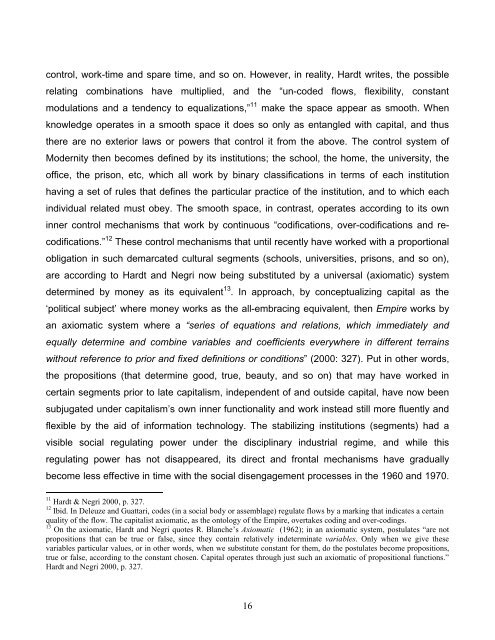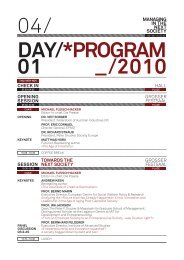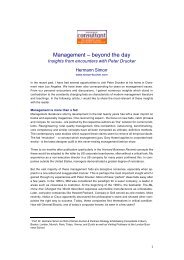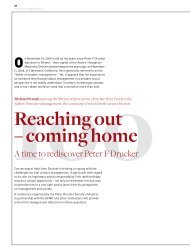From Industrial Capitalism to Taylorian Late Capitalism
From Industrial Capitalism to Taylorian Late Capitalism
From Industrial Capitalism to Taylorian Late Capitalism
Create successful ePaper yourself
Turn your PDF publications into a flip-book with our unique Google optimized e-Paper software.
control, work-time and spare time, and so on. However, in reality, Hardt writes, the possible<br />
relating combinations have multiplied, and the “un-coded flows, flexibility, constant<br />
modulations and a tendency <strong>to</strong> equalizations,” 11 make the space appear as smooth. When<br />
knowledge operates in a smooth space it does so only as entangled with capital, and thus<br />
there are no exterior laws or powers that control it from the above. The control system of<br />
Modernity then becomes defined by its institutions; the school, the home, the university, the<br />
office, the prison, etc, which all work by binary classifications in terms of each institution<br />
having a set of rules that defines the particular practice of the institution, and <strong>to</strong> which each<br />
individual related must obey. The smooth space, in contrast, operates according <strong>to</strong> its own<br />
inner control mechanisms that work by continuous “codifications, over-codifications and re-<br />
codifications.” 12 These control mechanisms that until recently have worked with a proportional<br />
obligation in such demarcated cultural segments (schools, universities, prisons, and so on),<br />
are according <strong>to</strong> Hardt and Negri now being substituted by a universal (axiomatic) system<br />
determined by money as its equivalent 13 . In approach, by conceptualizing capital as the<br />
‘political subject’ where money works as the all-embracing equivalent, then Empire works by<br />
an axiomatic system where a “series of equations and relations, which immediately and<br />
equally determine and combine variables and coefficients everywhere in different terrains<br />
without reference <strong>to</strong> prior and fixed definitions or conditions” (2000: 327). Put in other words,<br />
the propositions (that determine good, true, beauty, and so on) that may have worked in<br />
certain segments prior <strong>to</strong> late capitalism, independent of and outside capital, have now been<br />
subjugated under capitalism’s own inner functionality and work instead still more fluently and<br />
flexible by the aid of information technology. The stabilizing institutions (segments) had a<br />
visible social regulating power under the disciplinary industrial regime, and while this<br />
regulating power has not disappeared, its direct and frontal mechanisms have gradually<br />
become less effective in time with the social disengagement processes in the 1960 and 1970.<br />
11 Hardt & Negri 2000, p. 327.<br />
12 Ibid. In Deleuze and Guattari, codes (in a social body or assemblage) regulate flows by a marking that indicates a certain<br />
quality of the flow. The capitalist axiomatic, as the on<strong>to</strong>logy of the Empire, overtakes coding and over-codings.<br />
13 On the axiomatic, Hardt and Negri quotes R. Blanche’s Axiomatic (1962); in an axiomatic system, postulates “are not<br />
propositions that can be true or false, since they contain relatively indeterminate variables. Only when we give these<br />
variables particular values, or in other words, when we substitute constant for them, do the postulates become propositions,<br />
true or false, according <strong>to</strong> the constant chosen. Capital operates through just such an axiomatic of propositional functions.”<br />
Hardt and Negri 2000, p. 327.<br />
16








